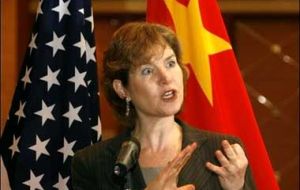MercoPress. South Atlantic News Agency
US takes China to WTO and paves way for more demands
 Piracy and counterfeiting levels in China remain unacceptably high said Schwab
Piracy and counterfeiting levels in China remain unacceptably high said Schwab United States on Monday dramatically sharpened trade tensions with China by launching a wide-ranging World Trade Organization complaint over copyright piracy and claims that Beijing restricts the distribution of foreign music, films and books.
The US decision comes hours before China announces its March trade figures which are expected to signal another area of friction since the surplus with the US is forecasted to have doubled from 11.2 billion in March 2006 to 20 billion this year. However US Trade Representative Susan Schwab said the President George Bush administration remains committed to dialogue with China. "Piracy and counterfeiting levels in China remain unacceptably high", she said. Poor protection of intellectual property rights (IPR) in China "costs US firms and workers billions of dollars each year," and for many products "also poses a serious risk of harm to consumers" around the world. The complaint over barriers to foreign media alleges that Chinese distribution rules "hobble" cultural products, such as books and Hollywood movies, from reaching the vast audience of the world's most populous nation. Schwab added that these products are also "favourite targets for IPR pirates," leaving legitimate foreign entertainment shut out of China altogether. Under the WTO process, the two countries will have 60 days to try to iron out their differences. If they do not reach agreement, the United States will then have the right to demand WTO arbitration. If the US case were ultimately upheld by a WTO dispute settlement panel, the United States could then gain the right to impose retaliatory duties and tariffs on Chinese imports. Getting tough after years of quiet diplomacy, the United States took China to the WTO in February in a complaint over industrial subsidies. And in an unprecedented decision late last month, the United States announced penalty tariffs on China to offset government subsidies for a paper product. The decision against imports of Chinese high-gloss paper prompted a strong reaction in Beijing. But US officials have repeatedly said they see WTO arbitration as the natural evolution of a maturing commercial relationship. While launching its WTO actions, the US administration under Treasury Secretary Henry Paulson has been pursuing a high-level dialogue with Beijing on strategic economic matters, a process that Schwab said would continue. The US trade deficit with China ballooned to more than 200 billion US dollars last year. Many US Congress members allege that Chinese government subsidies, discrimination against foreign companies and a skewed exchange rate are unfairly fuelling the country's export machine. According to a Congress-appointed panel, China's own data estimates that counterfeit products account for 15 to 20% of products made in the country, or 8% of its 2.2 trillion US dollars economy. China last Friday tightened its rules on IPR theft, lowering the threshold for "serious offenders" who will face up to seven years in jail, state media said. Anyone who produces more than 2,500 disks of movies, music or computer software is now regarded as a serious offender, down from the previous cut-off level of 5,000 disks, the China Daily reported. The US government welcomed that move. "However, wholesalers and distributors still will be able to operate below high thresholds without fear of criminal liability. "These thresholds appear to effectively permit large-scale piracy and counterfeiting." The US action also complained that fake goods, if seized by Chinese customs authorities, too easily end up on the black market "when WTO rules dictate that these goods normally should be kept out of the marketplace altogether." And it argued that while awaiting approval by Chinese censors, foreign media works are routinely faked with no right of redress for the rights holders.




Top Comments
Disclaimer & comment rulesCommenting for this story is now closed.
If you have a Facebook account, become a fan and comment on our Facebook Page!